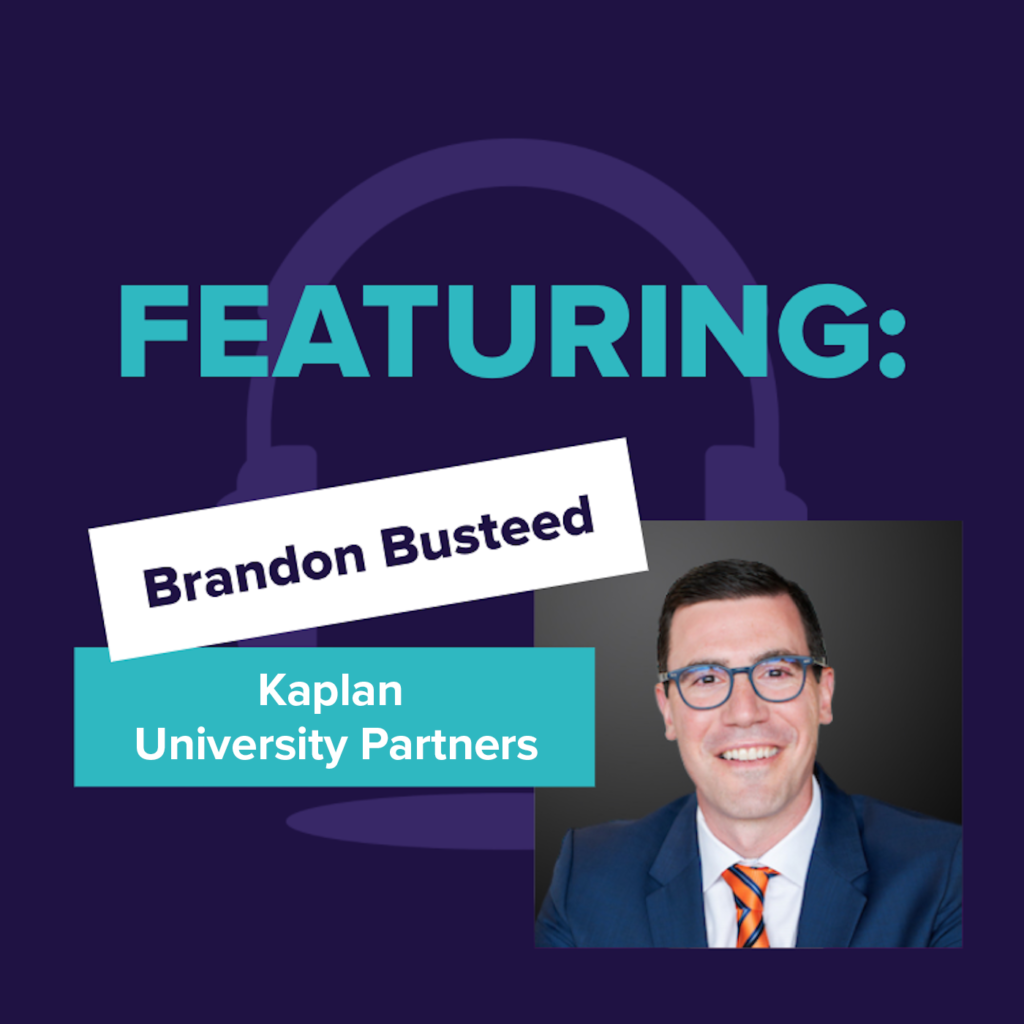On this episode of the RAISE podcast, Brent connects with Brandon Busteed, President of University Partnerships and Global Head of Learn-Work Innovation at Kaplan.
Highlights of this episode
- Brandon chose to attend Duke because the track coach, Al Buehler, told him, “I don’t care what kind of athlete you become here. What I most care about is what kind of man you become.”
- It’s not necessarily where you go to college. It’s how you do college. It’s about how you take advantage of the many opportunities that exist on almost all college campuses.
- For the past 50 years, institutions have been investing in physical improvements to college campuses. The next 50 years will likely focus on investing in the virtual college campus.
- What if elite universities expanded to serve one million students through differentiated teaching and learning models at differentiated price points? Now this would move the needle on improved access and equity in higher education.
- “Lifelong learning” is a phrase seen in nearly every college and university mission statement. But are institutions really delivering on this component of their mission?
- Mentorship can have a life-changing, multi-generational impact. But, only 9% of alumni nationally report that their alumni network was helpful to them. How can we change this?
About Brandon
Brandon Busteed and Brent Grinna met over twenty years ago as two young entrepreneurs on the Boston startup scene. They reconnect on the RAISE podcast, and you better believe their conversation is centered around innovation.
In this episode, Brandon reminds us that the business viability of higher education depends on the tangible ROI that students get after their major investment. He reflects on his experience in the for-profit world, pointing out that if a customer makes a significant investment in a product, they expect to receive a high level of customer service in return. For-profit companies employ dedicated Customer Success Managers to reach out to their most invested customers or clients on a regular basis to offer proactive support, training, and the latest product updates. Why doesn’t this level of support carry over to the customers of the business of higher ed – students and alumni?
Brandon points out that the price tag on most US colleges and Universities is increasing. Alongside it, doubt is also increasing among prospective students and their families that their investment will lead to a fulfilling, good paying job after graduation. Herein lie the two major issues facing (and threatening the future of) the higher ed industry.
Brent and Brandon also discuss how and where higher education must bring in new solutions to solve the growing doubt about the ROI of higher ed in the US. One of the most viable solutions is the focus on intentionally building supportive mentorship relationships with students while they are on campus, with the specific objective of building lifelong connections that support their personal and professional success. Brandon reflects on his own undergraduate experience at Duke University and acknowledges that he had very different feelings about Duke at the end of his sophomore year versus the end of his senior year. The difference was marked by the intentional mentor relationships he formed upon enrolling in the Hart Leadership Program.
Brandon calls our attention to the fact that at colleges and universities, there is a heavy focus on and investment in faculty research and scholarship. And, of course, research is incredibly valuable to the college community and to the world. But, research and scholarship don’t really align with the undergraduate experience. World-class teaching and mentoring requires a different, student-first focus. There are pockets of outstanding student service across the university, but it’s not really a norm in the college and university culture. How can we change that?
Brandon reflects on the fact that in every Kaplan building, you cannot pass through the door without meeting members of the student support team. Kaplan knows that students are highly-invested customers paying a big price tag. To this end, mentorship and job placement are guaranteed components of the Kaplan experience. Every business decision at Kaplan is done with a student- (customer-) first mindset. Mimicking this approach in any higher ed institution would create a culture in which “paying it forward” after graduation wouldn’t seem so foreign.
In this episode, Brandon hits our listeners with some really cool, dream-big ideas. What if elite institutions did away with the traditional academic calendar and offered the chance to complete a hybrid virtual/in-person bachelor’s degree in three years at a lower price point? What if institutions offered differentiated learning modes at corresponding tuition rates so that the likes of Duke University could educate a student base of one million, rather than one thousand? What if universities followed through on their “lifelong learning” promise to graduates and offered alumni a discounted tuition rate for continued non-degree education credits (think: “Duke Plus”)?
We have the most highly regarded higher education institutions in the world, but we also have the highest price points, overwhelming student debt rates, and growing unemployment. The pandemic broke our behavioral mindsets. Brandon reminds us to embrace this break and take a critical look at the innovative business practices that will ensure the future of US higher education.
Want to connect with Brandon? He can be found on LinkedIn, and on Bold Leaders in Learning, a live podcast that Brandon hosts on Thursdays from 2-2:30PM EST. Check it out.
